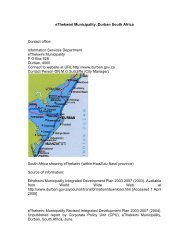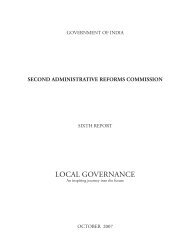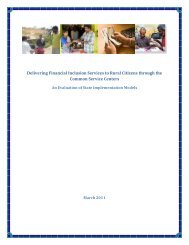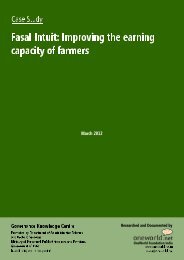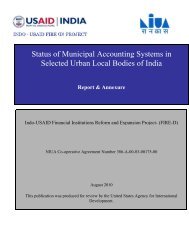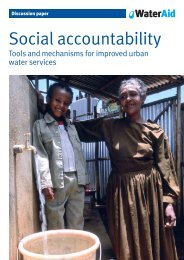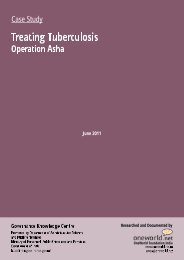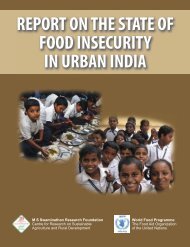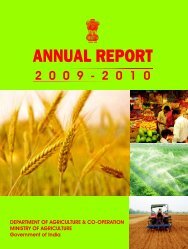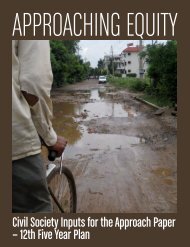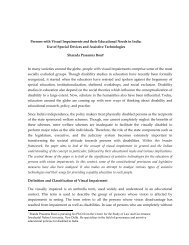Children educates community on sanitation - Governance in India
Children educates community on sanitation - Governance in India
Children educates community on sanitation - Governance in India
Create successful ePaper yourself
Turn your PDF publications into a flip-book with our unique Google optimized e-Paper software.
hygiene promoti<strong>on</strong>, and solid waste management and were supported by NGOs to develop projects likevermi compost<strong>in</strong>g, fisheries <strong>in</strong> urban sewage treatment, puppetry to communicate about diseases etc.OrissaFrom Sweta Patnaik, WaterAid <strong>India</strong>, BhubaneswarStreet <str<strong>on</strong>g>Children</str<strong>on</strong>g> Debate Water and Sanitati<strong>on</strong> ScenarioWaterAid's partner Ruchika Social Service Organisati<strong>on</strong> (RSSO) runs special schools for street childrenpromot<strong>in</strong>g Child Parliaments that debate Orissa’s water and sanitati<strong>on</strong> scenario. The children dress upas Members of Parliament/Legislative Assembly and enact a mock of the parliament <strong>in</strong> progress. RSSOprovides <strong>in</strong>formati<strong>on</strong> to these children and they raise questi<strong>on</strong>s and answers <strong>on</strong> dr<strong>in</strong>k<strong>in</strong>g water andsanitati<strong>on</strong> facilities and provisi<strong>on</strong>s made by the Government.Meena Clubs of Child Envir<strong>on</strong>ment Programme (CEP) <strong>in</strong> Kendrapara districtUnder UNICEF’s CEP Nature's Club, with support from the district adm<strong>in</strong>istrati<strong>on</strong> and Water andSanitati<strong>on</strong> Missi<strong>on</strong>, promoted MEENA Clubs <strong>in</strong> two blocks. The clubs c<strong>on</strong>sist<strong>in</strong>g of girls ages six tosixteen <strong>in</strong>spired by MEENA films tried to change the watsan situati<strong>on</strong> <strong>in</strong> their villages. The clubs acted aspressure groups to motivate and urge families and communities to c<strong>on</strong>struct and use toilets <strong>in</strong> homesand repair/ma<strong>in</strong>ta<strong>in</strong> dr<strong>in</strong>k<strong>in</strong>g water sources and <str<strong>on</strong>g>community</str<strong>on</strong>g> bathrooms.<str<strong>on</strong>g>Children</str<strong>on</strong>g> Us<strong>in</strong>g Participatory Analysis (PA) <strong>in</strong> Flood Pr<strong>on</strong>e Areas (from V.R. Raghavan, OxfamGB, Kolkata)While work<strong>in</strong>g with school children <strong>in</strong> promoti<strong>on</strong> of water and sanitati<strong>on</strong> <strong>in</strong> flood pr<strong>on</strong>e areas, c<strong>on</strong>textualPA <strong>in</strong> the school and village was used. <str<strong>on</strong>g>Children</str<strong>on</strong>g> analysed water and sanitati<strong>on</strong> scenarios at their homes,neighbourhood, <str<strong>on</strong>g>community</str<strong>on</strong>g> and school level. After identify<strong>in</strong>g the problems, they developed a dreamplan for their village and school, identify<strong>in</strong>g processes to achieve them. Thus, an activity plan isdeveloped, <strong>in</strong>tegrated with TSC <strong>in</strong> few schools and gaps are supported by Oxfam and partners.Multiple StatesPAHELI (Peoples Audit of Health, Educati<strong>on</strong> and Livelihoods) Survey Engages Participants(from Rukm<strong>in</strong>i Banerji, Pratham <strong>India</strong>, New Delhi)Pratham recently undertook a pictorial watsan survey. In each district, a local group collected data froma random sample of households- 30 villages/district <strong>in</strong> 11 districts across the country. The PAHELIsurvey was designed al<strong>on</strong>g the pr<strong>in</strong>ciples of the Annual Status of Educati<strong>on</strong> Report (ASER), and isfacilitated annually across the country by over 600 district partners. Use of this pictoral survey approachhas enabled participants to become more engaged <strong>in</strong> watsan activities.SWASTHH+ Program (from Madhu Ranjan, USAID, New Delhi)Aims at improv<strong>in</strong>g the school envir<strong>on</strong>ment with a focus <strong>on</strong> hygiene and sanitati<strong>on</strong> so as to also improvechildren's enrolment, attendance and retenti<strong>on</strong>, especially for girls, and eventually, improvement <strong>in</strong>learn<strong>in</strong>g. Multi-pr<strong>on</strong>ged approaches were undertaken by USAID such as tra<strong>in</strong><strong>in</strong>g/teach and learnmaterials <strong>in</strong> curriculum/learn<strong>in</strong>g camps etc are used to br<strong>in</strong>g change <strong>in</strong> the hygiene behaviour of schoolchildren and through them, the communities. Gradual but visible change has been observed. Read moreChakmak Champi<strong>on</strong> Program (from Sweta Patnaik, WaterAid <strong>India</strong>, Bhubaneswar)This program is part of WaterAid <strong>India</strong>’s nati<strong>on</strong>wide hand wash<strong>in</strong>g campaign. Some of the partnerschools select a "Chakmak" every m<strong>on</strong>th from each class- who is the "cleanest" child follow<strong>in</strong>gcorrect hand-wash<strong>in</strong>g practices, uses a toilet at home and school, uses footwear, etc. and mostimportantly, motivates others to do so.



